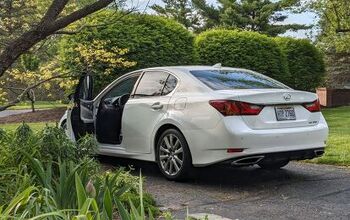New Vehicles Are More Powerful and Efficient Than Ever, but the Greenest Automaker Only Sells Gas Models: Study

Every year, the Environmental Protection Agency tabulates all available data for new vehicles sold in the United States and prints colorful graphs showing the country’s progress — or in some cases, regression — in key areas of autodom. Areas like average fuel economy, vehicle weight, horsepower, and emissions.
It’s a tradition dating back to the heady, wide-lapelled days of 1975.
The most recent report on light-duty vehicles in the U.S. shows definite, albeit incremental, progress towards many environmental goals. While the auto landscape may not be advancing at the rate preferred by many environmentalists, urbanists, and the Tesla fan base, there’s cause for celebration within the report’s pages. There’s also a special prize in there reserved just for Mazda.
Why Mazda? Well, the slightly offbeat, lower-volume automaker managed to earn the title of greenest vehicle fleet without a single hybrid or electric car in its portfolio.
In terms of average adjusted fuel economy, Mazda’s 2016 fleet topped all others with a rating of 29.6 miles per gallon. Sales-weighted carbon dioxide emissions of 301 grams per mile also topped all other brands, including second-place Hyundai (the most-improved automaker for 2016).
While Mazda, with a helping hand from Toyota, plans to enter the electrified arena in the near future, its love of high-compression four-cylinders and lack of trucks or very large (or larger and strong-selling) SUVs earns it the top spot on the tree-hugging podium.
Dead last for both fuel economy and greenhouse gas emissions was truck-heavy Fiat Chrysler. Compared to 2015, the average thirstiness of FCA’s fleet increased by 0.3 mpg, with CO2 emissions rising by 4 grams per mile. Also falling lower in the rankings for 2016 was Honda, Nissan, and BMW, all of which saw extra SUV volume in the last year with full data. Overall, the industry improved by 0.1 mpg and 2 grams per mile.
If that increase sounds pretty low, blame the consumer. The average fuel economy of all five classes of vehicle — car, crossover, body-on-frame SUV, truck, and minivan — rose in 2016, in some cases by a significant amount (both types of utility vehicle hit a record high, with pickups tying a 1986 record), but buyers took home many more large vehicles than the previous year. Combined market share of car-based and truck-based SUVs rose to 41 percent in 2016. Thus, the evolving mix decreased the fleetwide benefit of improvements made within each segment.
One thing that didn’t change in 2016 was average vehicle weight. Stable at 4,035 pounds, the figure belies the fact that the average weight of a new truck dropped by 24 pounds (thank you, midsize class and aluminum F-150), while cars shed, on average, 23 pounds. Average horsepower rose by one stallion to 230 hp.
As trucks and SUVs make up more of the mix, the EPA predicts an average vehicle weight increase of 9 pounds for 2017, plus a 2 hp boost in average engine output. At the same time, it projects a 0.5 mpg average increase, and 7 fewer grams of CO2 per mile.

More by Steph Willems
Latest Car Reviews
Read moreLatest Product Reviews
Read moreRecent Comments
- Master Baiter I told my wife that rather than buying my 13YO son a car when he turns 16, we'd be better off just having him take Lyft everywhere he needs to go. She laughed off the idea, but between the cost of insurance and an extra vehicle, I'd wager that Lyft would be a cheaper option, and safer for the kid as well.
- Master Baiter Toyota and Honda have sufficient brand equity and manufacturing expertise that they could switch to producing EVs if and when they determine it's necessary based on market realities. If you know how to build cars, then designing one around an EV drive train is trivial for a company the size of Toyota or Honda. By waiting it out, these companies can take advantage of supply chains being developed around batteries and electric motors, while avoiding short term losses like Ford is experiencing. Regarding hybrids, personally I don't do enough city driving to warrant the expense and complexity of a system essentially designed to recover braking energy.
- Urlik You missed the point. The Feds haven’t changed child labor laws so it is still illegal under Federal law. No state has changed their law so that it goes against a Federal child labor hazardous order like working in a slaughter house either.
- Plaincraig 1975 Mercury Cougar with the 460 four barrel. My dad bought it new and removed all the pollution control stuff and did a lot of upgrades to the engine (450hp). I got to use it from 1986 to 1991 when I got my Eclipse GSX. The payments and insurance for a 3000GT were going to be too much. No tickets no accidents so far in my many years and miles.My sister learned on a 76 LTD with the 350 two barrel then a Ford Escort but she has tickets (speeding but she has contacts so they get dismissed or fine and no points) and accidents (none her fault)
- Namesakeone If I were the parent of a teenage daughter, I would want her in an H1 Hummer. It would be big enough to protect her in a crash, too big for her to afford the fuel (and thus keep her home), big enough to intimidate her in a parallel-parking situation (and thus keep her home), and the transmission tunnel would prevent backseat sex.If I were the parent of a teenage son, I would want him to have, for his first wheeled transportation...a ride-on lawnmower. For obvious reasons.


































Comments
Join the conversation
Can we see another irrelevant article/study on the same subject, only removing the trucks from the line up of those companies that have trucks in them? Chrysler only sells two vehicles but Ram only has trucks, Dodge doesn't have trucks, but has all of those power houses. Chevrolet has several to choose from when you remove the truck line up, but GMC only has a few cross overs when you remove the truck line up. Toyota, Nissan, Honda also have trucks(even though a lot don't consider the Ridgeline a truck, it still has an open bed. The only companies I can think of that don't have a truck would be Hyundai, Mercedes(F/S vans though), BMW, Jaguar. How would the end be when the game is fair?
I don't think Mazda is intentionally doing that, but rather they have no budget building trucks and SUVs that makes a lot of money and has to settle for the low margin high mpg cars.